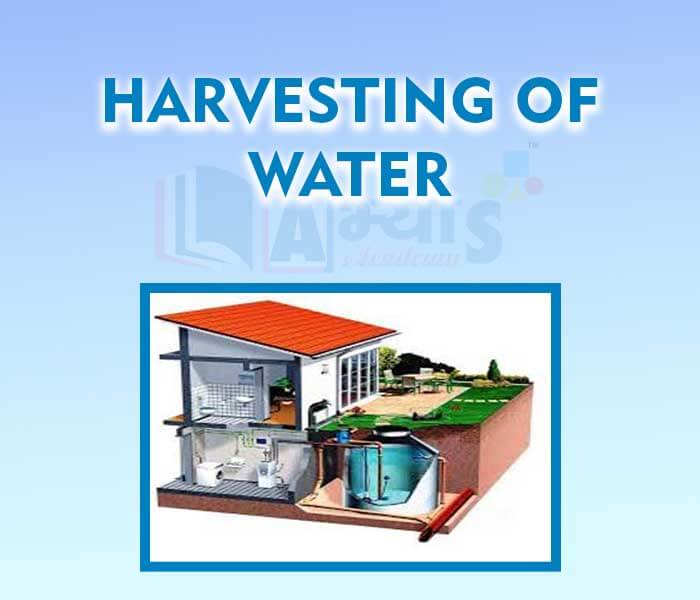Harvesting of Water







Harvesting of Water
Water harvesting: It means capturing rainwater where it falls or capturing the run-off water in a local area.
Conventional Methods of Water Harvesting: In India, different communities use hundreds of indigenous water saving methods to capture every trickle of water that had fallen on their land.
These methods are:
• Digging of small pits and lakes.
• Put in place simple watershed systems.
• Building small earthen dams.
• Constructing dykes, sand and limestone reservoirs.
• Setup rooftop water collecting units.
Traditional Water Harvesting System: In largely level terrain, the water harvesting structures are mainly crescent-shaped earthen embankments or low, straight concrete and rubble checkda.ms built across seasonally flooded gullies. Monsoon rains fill ponds behind the structures. Only the largest structures hold water year round and others usually get dry in six months or less after the monsoons.
Their main purpose however, is not to hold surface water, but to recharge the ground water beneath.
The various advantages of water stored in the ground are:
• It does not evaporate, but spreads out to recharge wells.
It provides moisture for vegetation over a wide area.
• It does not provide breeding grounds for mosquitoes like stagnant water collected in ponds or artificial lakes.
• The groundwater is also relatively protected from contamination by human and animal waste.
The various advantages of water stored in the ground are ___________________________.
| |||
| Right Option : D | |||
| View Explanation | |||
Ground water will not be depleted due to | |||
| Right Option : A | |||
| View Explanation | |||
Water harvesting is a method which _________________________ | |||
| Right Option : A | |||
| View Explanation | |||
Students / Parents Reviews [10]
I have spent a wonderful time in Abhyas academy. It has made my reasoning more apt, English more stronger and Maths an interesting subject for me. It has given me a habbit of self studying

Yatharthi Sharma
10thIt was good as the experience because as we had come here we had been improved in a such envirnment created here.Extra is taught which is beneficial for future.

Eshan Arora
8thAbout Abhyas metholodology the teachers are very nice and hardworking toward students.The Centre Head Mrs Anu Sethi is also a brilliant teacher.Abhyas has taught me how to overcome problems and has always taken my doubts and suppoeted me.

Shreya Shrivastava
8thMy experience was very good with Abhyas academy. I am studying here from 6th class and I am satisfied by its results in my life. I improved a lot here ahead of school syllabus.

Ayan Ghosh
8thOne of the best institutes to develope a child interest in studies.Provides SST and English knowledge also unlike other institutes. Teachers are co operative and friendly online tests andPPT develope practical knowledge also.

Aman Kumar Shrivastava
10thAbhyas is a complete education Institute. Here extreme care is taken by teacher with the help of regular exam. Extra classes also conducted by the institute, if the student is weak.

Om Umang
10thAbhyas Methodology is very good. It is based on according to student and each child manages accordingly to its properly. Methodology has improved the abilities of students to shine them in future.

Manish Kumar
10thMy experience with Abhyas is very good. I have learnt many things here like vedic maths and reasoning also. Teachers here first take our doubts and then there are assignments to verify our weak points.

Shivam Rana
7thIt has a great methodology. Students here can get analysis to their test quickly.We can learn easily through PPTs and the testing methods are good. We know that where we have to practice

Barkha Arora
10thIt was a good experience with Abhyas Academy. I even faced problems in starting but slowly and steadily overcomed. Especially reasoning classes helped me a lot.
